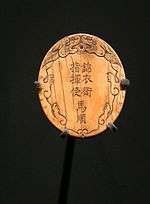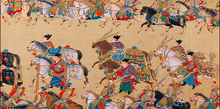Embroidered Uniform Guard
The Embroidered Uniform Guard (simplified Chinese: 锦衣卫; traditional Chinese: 錦衣衞; pinyin: Jǐnyīwèi; lit.: 'brocade-clad guard') was the imperial secret police that served the emperors of the Ming dynasty in China.[1][2] The guard was founded by the Hongwu Emperor in 1368 to serve as his personal bodyguards. In 1369 it became an imperial military body. They were given the authority to overrule judicial proceedings in prosecutions with full autonomy in arresting, interrogating and punishing anyone, including nobles and the emperor's relatives.

The Embroidered Uniform Guard was tasked with collecting military intelligence on the enemy and participation in battles during planning. The guards donned a distinctive golden-yellow uniform, with a tablet worn on his torso, and carried a special blade weapon.
History
The Jinyiwei originated as early as 1360. They served as Zhu Yuanzhang's personal bodyguards and defended him during a battle with the warlord Chen Youliang. After Zhu founded the Ming dynasty and became the Hongwu Emperor, he doubted his subjects' loyalties towards him and was constantly on guard against possible rebellions and assassinations. One of the early duties of the Jinyiwei was to help the emperor spy on his subjects. The Hongwu Emperor increased the Jinyiwei's duties later, allowing them to inspect his officials at work in the capital city, before formally establishing the organisation in 1382, with about 500 members. Their numbers increased to around 14,000 in three years.
In 1393, the Hongwu Emperor reduced the Jinyiwei's duties after they allegedly abused their authority during the investigation of a rebellion plot by Lan Yu, in which about 40,000 people were implicated and executed. When the Yongle Emperor ascended to the throne, he was afraid that his subjects might be discontented with him, because he came to power by usurping his nephew's throne. He reinstated the Jinyiwei's authority to increase his control over the imperial court. The Jinyiwei was disbanded after 262 years of existence when Li Zicheng's rebel forces overthrew the Ming dynasty in 1644.


Service
The Embroidered Guard were authorized to overrule judicial proceedings in prosecuting those deemed as enemies of the state, granted with full autonomy in arresting, interrogating, detaining them without trial and punishing them, without going through due process. They were bound to the service of the emperor and took direct orders from him. They also served as political commissars for the Ming armies in times of war. In the later years of the Ming dynasty, the Jinyiwei were placed under the control of the Eastern Depot/Dong Chang faction. As the government sank into corruption, the Jinyiwei was constantly used as a means of eliminating political opponents through assassinations and legal prosecutions.
Headquarters
The headquarters of the Jinyiwei was to the west of Tian’anmen Square where the Great Hall of the People is located at present.
In popular culture
- The 1985 Hong Kong Shaw Brothers film Secret Service of the Imperial Court, Chinese title Jinyiwei, starred Bryan Leung as a Jinyiwei commander.
- The 2010 television series Yi Zhi Mei, produced by Chinese Entertainment Shanghai, features the Jinyiwei as devoted to the corrupt Prime Minister.
- The 2010 film 14 Blades featured the Jinyiwei, starring Donnie Yen as a Jinyiwei commander.
- The 2011 Hong Kong television series Relic of an Emissary produced by TVB starred Michael Tse as a Jinyiwei commander.
- The 2014 film Brotherhood of Blades directed by Lu Yang is set towards the end of the Ming dynasty.
- The wuxia manhua Blood and Steel features the Jinyiwei as one of the multiple factions striving for power in the martial arts world.
- The webcomic Drive by Dave Kellett features a futuristic secret police organization named the Jinyiwei.
- The webcomic My Boyfriend is a Jinyiwei by Hong Yi features a Jinyiwei character that time travelled from the Ming dynasty to the present.
- The video game For Honor, by Ubisoft features the playable character "Zhanhu", based on the Jinyiwei.
- The drama Under the Power, Chinese title Jin Yi Zhi Xia, directed by Yi Tao, features the character Lu Yi, who is a Jinyiwei
References
- Tsai, Shih-shan Henry (1996). The Eunuchs in the Ming Dynasty. SUNY Press. pp. 98–100. ISBN 0791426874.
- Xie Baocheng (2013). Brief History of the Official System in China. Paths International Ltd. p. 24. ISBN 1844641538.